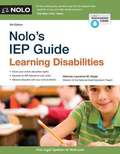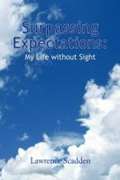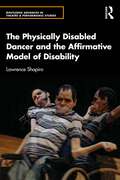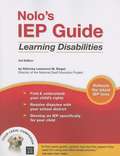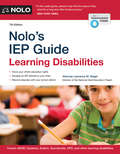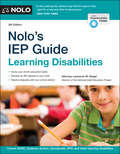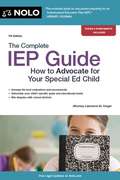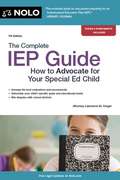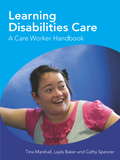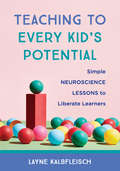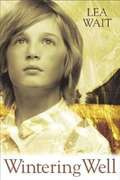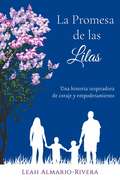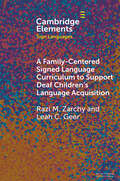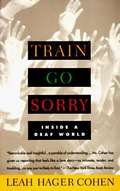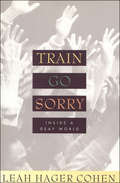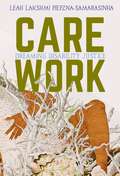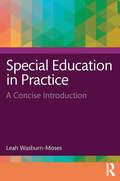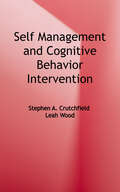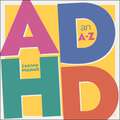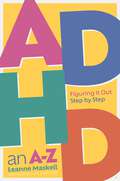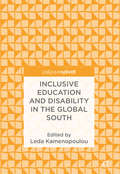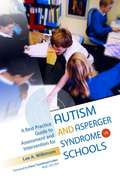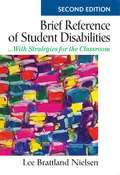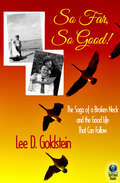- Table View
- List View
Nolo's IEP Guide
by Lawrence M. SiegelCreate an individualized education plan (IEP) and secure the education your child deserves! Children with learning disabilities have different needs than other kids in special education let Nolo's IEP Guide: Learning Disabilities help you work with your child's school to make sure those needs are met. This one of a kind book walks you through the Individual Education Program process, providing all the instructions, suggestions, resources, and forms you need to understand the special education system. Step by step, you'll learn how to: understand your child's rights prepare to make your case untangle eligibility rules and evaluations develop effective IEP goals figure out the best programs, services and teaching strategies get ready for IEP meetings resolve disputes with the school district do legal research on learning disability issues This edition has been updated to reflect the latest laws, federal regulations, and court decisions that affect the IEP process, and includes fully up to date forms, sample letters, and resources to help you every step of the way. Plus, read an expanded section about "appropriate" education measures resulting from a recent U.S. Supreme Court case, and get new details on eligibility for special education services for your child.
Surpassing Expectations: My Life without Sight
by Lawrence ScaddenThe booktells the story of the author's life without sight,a memoir that recalls the activities that brought him international acclaim as a scientist, policymaker, and advocate.
The Physically Disabled Dancer and the Affirmative Model of Disability (Routledge Advances in Theatre & Performance Studies)
by Lawrence ShapiroThis volume investigates the contributions and achievements of the physically disabled dancer while challenging and recognizing the inherent inequities in the field of integrated dance in the UK which currently places greater emphasis on the learning‑disabled performer. This is the first book ever written by a physically disabled dancer on the subject of physically disabled dancers. Inherent in this examination is the model of examining disability that is most closely associated with the disability arts movement which is the ‘affirmative model of disability’. This model is defined as an approach to disability in which the disabled person is neither an object of medical care nor a victim of social indifference but a self‑respecting, autonomous individual in which their disability is a positive and affirming aspect of their self‑identity. This book, based on interviews with physically disabled dancers, choreographers, academics and arts producers all in a UK context, combines a wide range of perspective of disability dance together with the intellectual rigour of disability studies to produce a new definition of the physically disabled dancer as an affirming, positive, indispensable practitioner of contemporary performance art. The volume pioneers perspectives of the physically disabled dancer prioritizing first‑person accounts from the performers themselves to produce an unprecedented contribution to the study of disability arts from a uniquely British perspective.This book will offer educators as well as arts and cultural professionals a critical resource for facilitating work by and in alliance with practitioners of integrated dance.
IEP Guide: Learning Disabilities
by Lawrence SiegelUsing plain language, Siegel, a special education attorney, explains assessments, goals and objectives, eligibility requirements, and other IEP issues in this resource for parents of children with learning disabilities. He walks through the entire IEP process, providing instructions, checklists, sample forms and letters, and numerous suggestions for specific actions to take. He gives advice on finding and understanding information on a child's rights, and tells how to prepare for IEP meetings and how to resolve disputes with the school district. Appendices list relevant laws and regulations, federal and state departments of education, and support and advocacy groups. Annotation ©2004 Book News, Inc., Portland, OR (booknews.com)
Nolo's IEP Guide: Learning Disabilities
by Lawrence SiegelHow to advocate for your child's education. According to the National Center for Learning Disabilities, 2.4 million children in the U.S. are diagnosed with learning disabilities – and these children have unique educational needs. While federal law entitles each of these children to an “appropriate” education, making sure teachers and school administrators are addressing a child’s special needs and providing the proper services can feel like an uphill battle. This book will help guide you through your child’s IEP process by explaining your child’s rights and teaching you how to draft educational goals and objectives, research school programs and alternatives, prepare for IEP meetings, and resolve disputes with your school district. Learn how to : identify a learning disability understand your child's rights to education untangle eligibility rules and evaluations prepare and make your best case to school administrators develop IEP goals and advocate for their adoption, explore and choose the best programs and services. Nolo's IEP Guide: Learning Disabilities is written by an expert who's fought for kids for many years.
Nolo's IEP Guide: Learning Disabilities
by Lawrence SiegelHow to advocate for your child’s education Many children have learning disabilities—and it’s up to parents and schools to work together to ensure that each child’s unique educational needs are met. But what if the school disagrees with your goals for your child? You are at a disadvantage if you don’t know the law. This book teaches you to: identify a learning disability understand your child's rights to education untangle eligibility rules and evaluations prepare and make your best case to school administrators develop IEP goals and advocate for their adoption, and explore and choose the best programs and services. Written by an expert who’s fought for kids for many years, the 8th edition includes summaries of important court decisions and expanded information on independent evaluations and bullying, and provides the forms, sample letters, resources, and encouragement you need. With Downloadable Forms: download forms, letters and resources (details inside).
Complete IEP Guide, The
by Lawrence Siegel AttorneyCreate an IEP with this start-to-finish guide for caring parents Your special needs child needs a special education, and as a parent, you face a number of obstacles as you work with your school district to develop an Individual Education Plan (IEP) - lots of steps, complicated paperwork, and intimidating procedures may seem like too much to take on... ...but you can do it! Let The Complete IEP Guide guide you through this complex process with vital information, strategies, and the encouragement you need to secure your child's education. Get everything you need to: understand your child's rights untangle eligibility rules and assessments collect all school records draft goals and objectives pinpoint specific problems develop a blueprint of program and services research school programs and alternative prepare for IEP meetings resolve disputes with your school district Whether you're new to the IEP process or entering it once again, this user-friendly, plain English guide is your outline for an effective educational experience for your child. You'll get all the forms, sample letters, and resources that you could possibly need at any stage of the IEP process. The 7th edition is completely updated to reflect the latest -- and major -- changes to federal regulations concerning your special education student, including details about your child's eligibility for special education services.
Nolo's IEP Guide
by Lawrence Siegel AttorneyCreate an individualized education plan (IEP) and secure the education your child deserves! Children with learning disabilities have different needs than other kids in special education -- let Nolo's IEP Guide: Learning Disabilities help you work with your child's school to make sure those needs are met. This one-of-a-kind book walks you through the Individual Education Program process, providing all the instructions, suggestions, resources, and forms you need to understand the special education system. Step by step, you'll learn how to: understand your child's rights prepare to make your case untangle eligibility rules and evaluations develop effective IEP goals figure out the best programs, services and teaching strategies get ready for IEP meetings resolve disputes with the school district do legal research on learning-disability issues The 5th edition has been updated to reflect the latest laws, federal regulations, and court decisions that affect the IEP process, and includes fully up-to-date forms, sample letters, and resources to help you every step of the way. Plus, read an expanded section about "appropriate" education measures resulting from a recent U.S. Supreme Court case, and get new details on eligibility for special education services for your child.
Learning Disabilities Care A Care Worker Handbook
by Tina Marshall Layla BakerWorking with people with Learning Disabilities? Training in Learning Disabilities care? You don't have to go it alone!Caring for people with Learning Disabilities is one of the most challenging and rewarding roles in Health and Social Care. But with a range of awards, certificates and pathways available to work-based learners it can be a confusing area. That's why we've put together a one-stop handbook to support your training and continuing professional development in caring for people with learning disabilities.Here in one place is all the topic knowledge, assessment support and practical advice you will need for a range of learning disabilities qualifications. Core topics are linked to the specific learning and assessment objectives you need to cover for up to 22 QCF units. Case studies tie learning into the many different situations and roles across Home Care, Residential Care, NHS and Private Settings.This book is especially useful for candidates taking the: Level 2 Award in Learning Disabilities Level 2 Certificate in Learning Disabilities Level 3 Award in Learning Disabilities Level 3 Certificate in Learning DisabilitiesIt's also a must have reference for those who want to brush up skills and knowledge from previous qualifications.So whatever your level of specialism, give yourself the tools you need to survive and support your clients with learning disabilities.
Teaching to Every Kid's Potential: Simple Neuroscience Lessons To Liberate Learners
by Layne Kalbfleisch MED, PhD“Teachers hold the potential to provide a student with frustration or opportunity every day—and those states are closer together than you might think.” When students repeatedly lose track of directions or take a long time to solve problems, it’s easy for teachers to see the distracted or off-task behavior, but not always to see the root of the problem. Quite often the same child who has an underdeveloped skill may have an opposing but hidden strength: a slow processor of information may also be a deep thinker. Teaching to Every Kid’s Potential is an invitation to teachers to improve the learning in their classrooms, one student at a time, using practical, evidence-based strategies. Focusing on four big concepts from neuroscience—flexibility, readiness, connection, and masking—the author shows how to apply them to build on the strengths of students. Each chapter unpacks the science; shows how talents can compensate for neural processing issues and suggests small but powerful adjustments to classroom practice that can allow kids’ gifts to emerge.
Wintering Well
by Lea Wait"WHAT HAPPENED THIS AFTERNOON IS TOO TERRIBLE TO WRITE. . . . PLEASE, GOD, LET WILL LIVE. AND, PLEASE, GOD, FORGIVE ME. " All Will Ames ever wanted to do was farm. But when he's injured in a farm accident, Will is left without a leg -- and without his future. There's no place on a farm for a cripple. And so, after a long winter of healing, Will and his sister Cassie, who blames herself for the accident, go to stay in town with their older sister and her husband. There, as Maine becomes a state, Will learns that perhaps even without his leg, there's another, brighter future in store for him. And Cassie, too, learns that maybe, in the changing world of 1820, Will isn't the only one with the chance at a different, exciting future. . . .
La promesa de las Lilas: Una historia inspiradora de coraje y empoderamiento
by Leah Almario-RiveraEPILOGO De vez en cuando, mis amigos y familia me conectan con alguien que tiene un miembro de la familia diagnosticado con autismo, en caso de que pueda darles una mano u ofrecerles consejos. “¿Qué sugieres que haga? ¿Tienes algunas pautas?” Mi corazón se va con esa familia. ¿Cómo puedo ayudar cuando estoy a miles de kilómetros de ellos? En otros casos me han preguntado, “¿Por qué no trabajas directamente con niños con autismo ya que se beneficiarán de tu conocimiento?” Ojalá pudiera. Especialmente en América del Norte, las familias solo tratan con profesionales certificados en la materia. Mi conocimiento se limita a mi experiencia personal. En la reunión de atletismo del año pasado, un padre que conocía a Gordon desde el jardín de niños vino hacia mí. “¡Mira a tu hijo! Ha pasado por un largo camino.” Le sonreí, y mientras miraba a Gordon de reojo sonreí con mucho orgullo y asentí. Sí, estoy orgullosa de él. “Deberías escribir un libro.” Sugirió el padre. “¿Por qué?” Fruncí el ceño reaccionando a su sugerencia. “Gordon no es un prodigio ni ha desarrollado habilidades extraordinarias atribuidas popularmente a gente con autismo.” “Se han escrito muchas historias sobre éstas personas asombrosas. Pero el universo también está interesado en la historia de Gordon.” Agregó. Reflexioné ante la idea. Es cierto. Mi hijo tal vez no tenga habilidades increíbles, pero su historia puede servir de inspiración. Nunca había pensado en escribir nuestro viaje. Al pasar los años, la incidencia del autismo ha crecido. Cada vez que menciono ‘autismo’, el extraño con el que estoy hablando inmediatamente compartirá su historia sobre alguien que conoce que también está en el espectro (desorden del espectro autista) y se podría beneficiar de mis consejos e historia. Mientras tanto y afortunadamente, una gran dive
A Family-Centered Signed Language Curriculum to Support Deaf Children's Language Acquisition (Elements in Sign Languages)
by Razi M. Zarchy Leah C. GeerDeaf children experience language deprivation at alarmingly high rates. One contributing factor is that most are born to non-signing hearing parents who face insurmountable barriers to learning a signed language. This Element presents a case for developing signed language curricula for hearing families with deaf children that are family-centered and focus on child-directed language. Core vocabulary, functional sentences, and facilitative language techniques centered around common daily routines allow families to apply what they learn immediately. Additionally, Deaf Community Cultural Wealth (DCCW) lessons build families' capacity to navigate the new terrain of raising a deaf child. If early intervention programs serving the families of young deaf children incorporate this type of curriculum into their service delivery, survey data suggest that it is both effective and approachable for this target population, so the rates of language deprivation may decline.
Train Go Sorry: Inside a Deaf World
by Leah Hager CohenThis portrait of New York's Lexington School for the Deaf is not just a work of journalism. It is also a memoir, since Leah Hager Cohen grew up on the school's campus and her father is its superintendent. As a hearing person raised among the deaf, Cohen appreciates both the intimate textures of that silent world and the gulf that separates it from our own.
Train Go Sorry: Inside a Deaf World
by Leah Hager CohenA &“remarkable and insightful&” look inside a New York City school for the deaf, blending memoir and history (The New York Times Book Review). Leah Hager Cohen is part of the hearing world, but grew up among the deaf community. Her Russian-born grandfather had been deaf—a fact hidden by his parents as they took him through Ellis Island—and her father served as superintendent at the Lexington School for the Deaf in Queens. Young Leah was in the minority, surrounded by deaf culture, and sometimes felt like she was missing the boat—or in the American Sign Language term, &“train go sorry.&” Here, the award-winning writer looks back on this experience and also explores a pivotal moment in deaf history, when scientific advances and cultural attitudes began to shift and collide—in a unique mix of journalistic reporting and personal memoir that is &“a must-read&” (Chicago Sun-Times). &“The history of the Lexington School for the Deaf, the oldest school of its kind in the nation, comes alive with Cohen&’s vivid descriptions of its students and administrators. The author, who grew up at the school, follows the real-life events of Sofia, a Russian immigrant, and James, a member of a poor family in the Bronx, as well as members of her own family both past and present who are intimately associated with the school. Cohen takes special pride in representing the views of the deaf community—which are sometimes strongly divided—in such issues as American Sign Language (ASL) vs. oralism, hearing aids vs. cochlear implants, and mainstreaming vs. special education. The author&’s lively narrative includes numerous conversations translated from ASL . . . a one-of-a-kind book.&” —Library Journal &“Throughout the book, Cohen focuses on two students whose Russian and African American roots exemplify the school&’s increasingly diverse population . . . beautifully written.&” —Booklist
Care Work: Dreaming Disability Justice
by Leah Lakshmi Piepzna-Samarasinha<p>In their new, long-awaited collection of essays, Lambda Literary Award-winning writer and longtime disability justice activist and performance artist Leah Lakshmi Piepzna-Samarasinha explores the politics and realities of disability justice, a movement that centres the lives and leadership of sick and disabled queer, trans, Black, and brown people, with knowledge and gifts for all. Leah writes passionately and personally about creating spaces by and for sick and disabled queer people of colour, and creative "collective access" -- access not as a chore but as a collective responsibility and pleasure -- in our communities and political movements. Bringing their survival skills and knowledge from years of cultural and activist work, Piepzna-Samarasinha explores everything from the economics of queer femme emotional labour, to suicide in queer and trans communities, to the nitty-gritty of touring as a sick and disabled queer artist of colour. <p>Care Work is a mapping of access as radical love, a celebration of the work that sick and disabled queer/people of colour are doing to find each other and to build power and community, and a toolkit for everyone who wants to build radically resilient, sustainable communities of liberation where no one is left behind. Powerful and passionate, Care Work is a crucial and necessary call to arms.</p>
The Future Is Disabled: Prophecies, Love Notes and Mourning Songs
by Leah Lakshmi Piepzna-SamarasinhaIn this book, Leah Lakshmi Piepzna-Samarasinha asks some provocative questions: What if, in the near future, the majority of people will be disabled—and what if that's not a bad thing? And what if disability justice and disabled wisdom are crucial to creating a future in which it's possible to survive fascism, climate change, and pandemics and to bring about liberation? Building on the work of her game-changing book Care Work: Dreaming Disability Justice, Piepzna-Samarasinha writes about disability justice at the end of the world, documenting the many ways disabled people kept and are keeping each other—and the rest of the world—alive during Trump, fascism and the COVID-19 pandemic. Other subjects include crip interdependence, care and mutual aid in real life, disabled community building, and disabled art practice as survival and joy. Written over the course of two years of disabled isolation during the pandemic, this is a book of love letters to other disabled QTBIPOC (and those concerned about disability justice, the care crisis, and surviving the apocalypse); honor songs for kin who are gone; recipes for survival; questions and real talk about care, organizing, disabled families, and kin networks and communities; and wild brown disabled femme joy in the face of death. With passion and power, The Future Is Disabled remembers our dead and insists on our future. This updated edition includes a new chapter and afterword by the author.
Special Education in Practice: A Concise Introduction
by Leah Wasburn-MosesThis concise yet comprehensive text offers an introduction to special education practice. It covers the basics in the field—including key definitions, history, and policy—and focuses on evidence-based practices in teaching, strategies for inclusive schools and classrooms, and contemporary issues affecting at-risk students more broadly. The book consists of six chapters designed to fit within various models of practice-based preparation and invites deliberate connections between the ideas it presents, and the active classroom practice it encourages. Each chapter features suggested collaboration and practice activities, and inquiry activities presented in the last chapter align with the 22 High Leverage Practices (HLPs) identified by leading researchers in the field. Special Education in Practice is an ideal text for teacher candidates in any licensure or teacher preparation program working within a practice-based setting.
Self-Management and Cognitive Behavior Interventions
by Stephen A. Crutchfield Leah WoodSelf-Management and Cognitive Behavior Interventions is a guide to using cognitive behavior modification (CBM) with students with autism spectrum disorder (ASD) to increase the student's self-management. CBM approaches include self-management intervention (SMI) and cognitive behavior intervention (CBI). SMI is synonymous with self-regulation and encompasses a variety of cognitive processes, such as controlling emotions, attending to relevant information, planning future behavior, remaining flexible through unplanned setbacks, and behaving in a way that enhances the likelihood of achieving future goals. SMI is managed by the student and is used to address a wide variety of target behaviors. CBI helps individuals examine their thoughts and emotions and adopt actions that change their thinking as well as their behavior. This book examines specific, research-based cognitive behavior interventions and self-management interventions and explores designing and implementing interventions for students with ASD.
ADHD an A-Z: Figuring it Out Step by Step
by Leanne MaskellA guide to navigating life as a young adult with ADHD - from someone who's been through it allNavigating the world with an ADHD brain can be exhausting. The rollercoaster ride from clinical assessments through diagnosis to treatment can leave you feeling anxious and isolated, worried about failing or feeling different.This handy guide is here to change all that. If you have (or suspect you have) ADHD, you'll know the frustration of being given neurotypical or clinical advice - but this is straight from an ADHD brain to you.The accessible A-Z format, covering everything from burnout and finances to time management and relationships, gives you the tips and confidence you need to reach your full potential. It empowers you to understand why ADHD brains work the way they do and how to harness your unique mind to think creatively and overcome any hurdle life throws at you.Easy to digest and full to the brim with practical life advice including budgeting plans for impulsive spending, advice on rejection sensitive dysphoria and ways to relax, this audiobook provides everything you need to feel confident and supported through your ADHD diagnosis and beyond.(P) 2022 Jessica Kingsley Publishers
ADHD an A-Z: Figuring it Out Step by Step
by Leanne MaskellNavigating the world with an ADHD brain can be exhausting. The rollercoaster ride from clinical assessments through diagnosis to treatment can leave you feeling anxious and isolated, worried about failing or feeling different.This handy guide is here to change all that. If you have (or suspect you have) ADHD, you'll know the frustration of being given neurotypical or clinical advice - but this is straight from an ADHD brain to you.The accessible A-Z format, covering everything from burnout and finances to time management and relationships, gives you the tips and confidence you need to reach your full potential. It empowers you to understand why ADHD brains work the way they do and how to harness your unique mind to think creatively and overcome any hurdle life throws at you.Easy to digest and full to the brim with practical life advice including budgeting plans for impulsive spending, advice on rejection sensitive dysphoria and ways to relax, this book provides everything you need to feel confident and supported through your ADHD diagnosis and beyond.
Inclusive Education and Disability in the Global South
by Leda KamenopoulouThis edited volume examines inclusive education and disability in the global South. Presenting four qualitative research studies conducted in Malaysia, Bhutan, Philippines and Belize, the authors examine the implementation of inclusive education and disabled children’s participation in the education system: contexts on which very little is known. Thus, this book provides a unique opportunity to access rare context-specific information concerning this region of the world; and to reflect on the particular challenges some countries face in the realization of full participation of all children within education. Authored by researchers who are also teaching professionals with experience and understanding of the complexities of the real world, this book reminds us that researchers and policy makers must listen to all voices and perspectives: especially those that have remained silenced and ignored.
A Best Practice Guide to Assessment and Intervention for Autism and Asperger Syndrome in Schools
by Lee A. Wilkinson*Winner in the Education/Academic category of the 2011 Next Generation Indie Book Awards**Shortlisted for the 2011 NASEN Award 'The Special Needs Academic Book'*With a focus on best practice and the importance of early diagnosis, this book provides a practical and scientifically-based approach to the assessment and diagnosis of Asperger Syndrome and autism spectrum conditions. This book offers a balance of conceptual, practical and empirical information designed to bridge the research-to-practice gap in identifying, assessing, and treating school-aged children with autism-related conditions. Assessment tools and intervention strategies will support school-based professionals in:· identifying and assessing young people with high-functioning autism spectrum conditions· developing and implementing classroom-based intervention programs· initiating a dialogue between parents and teachers· accessing community resources· promoting special needs advocacy. With illustrative case studies, FAQs, quick reference boxes, and a glossary, this accessible guide will appeal to teachers, counsellors, psychologists, social work practitioners and students.
Brief Reference of Student Disabilities: ...With Strategies for the Classroom
by Lee Brattland NielsenThis updated edition provides information about common exceptionalities, ADHD and bipolar disorder, legal considerations, and discussions on postsecondary transition, NCLB, and the reauthorization of IDEA 2004.
So Far, So Good!: The Saga of a Broken Neck, and the Good Life that Can Follow
by Lee D. GoldsteinThe candid and inspiring memoir of one man&’s rewarding life spent in a chair—a story of family, spinal injury, and choosing happiness. Lee Goldstein was fourteen years old when an innocent day at the beach ended in a life-altering accident. Yet even in the midst of that fateful tragedy, Lee finds reasons to be grateful—after all, he was rescued from drowning by a famous singer and hobnobbed with celebrities in the hospital. Lee would spend the rest of his life as a quadriplegic, but thanks to the support of his loving family and his own unflagging determination, he lives a long and beautiful life. Lee and his wife Marilyn raise five adopted children, including Tim, who faces his own challenges when he is diagnosed with autism. Though he later loses Marilyn, Lee goes on to fall in love with and marry Ellen, who makes his later years close to divine. Lee always focuses on the positive, but he pulls no punches in his frank and honest account of what quadriplegics and their caretakers deal with every day, from the use of wheelchairs, to bathroom needs, to the sometimes life-threatening, embarrassing, or hilarious moments of life.
